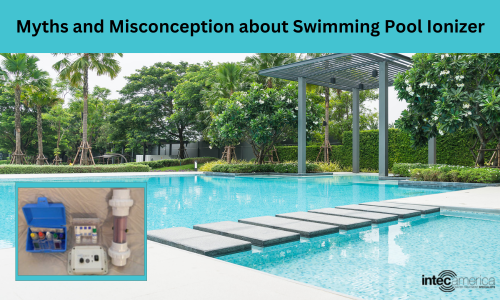Owning a private swimming pool at your residence or vacation home is something many people may dream about. However, periodic maintenance is required for a clean and safe pool can be challenging. While chlorine has been the conventional pool cleaning chemical for the last several decades, the use of chlorine-free pool ionizers is gaining traction. This is a safe and effective way to clean the pool without any side effects or disinfection byproducts. Ionizers release metal ions into the water to inactivate the growth of microorganisms. It purifies the water without leaving any harmful byproducts in the swimming pool. Thus, the popularity of pool ionizers has increased immensely. Despite this fact, many misconceptions about swimming pool ionizers prevent people from considering them as an option. Would you like to know what they are? This post addresses the same and provides accurate information to help you make an informed decision. So, stay tuned.

6 Common Myths About Swimming Pool Ionizers
These are some common misconceptions about swimming pool ionizers.
- Pool Ionizers Still Require Chlorine: This is one common misconception many of us have. True high-end pool ionizers produce cupric ions and will completely replace the need for chlorine. These are not filters and would require a clarifier or mild oxidant to be added once a week to assist the filter in fine particles. This would address clarity issues related to suspended organic matter, such as sweat and dead algae and bacteria.
- Pool Ionizers Are Not Safe for Swimmers: Another misconception about swimming pools is that they harm swimmers. However, ionizers use transition metals alloys or copper ions. These ions are naturally occurring elements that are not harmful in low concentrations. Technically, silver and copper are commonly used in medical and other applications where human contact is necessary.
- Pool Ionizers Are Expensive: Many people think that pool ionizers are expensive, but this is not always true. The initial cost of purchasing may be slightly higher than other systems; however, in the long term it is the least expensive to maintain the water chemistry. Quality systems cost about the same as a saltwater chlorinator. Ionizers require fewer chemicals and less maintenance than other systems, thus saving pool owners time and money in the long run.
- Pool Ionizers Are Only Effective for Small Pools: Some people believe that pool ionizers are only effective in small pools, but this is not true. Ionizers can be effective in pools of all sizes. Although, larger pools may require more than one ionizer unit to maintain proper water quality. Additionally, ionizers can also be used with other pool maintenance systems, such as ozone generators, to provide additional benefits.
- Pool Ionizers Requires Electricity to Operate: Many people think that pool ionizers require electricity, but this is not always the case. Several types of ionizers are available, including solar-powered ionizers and those that use the flow of water to generate ions. While some ionizers require electricity, it is not required for all systems. The solar ionizers are small and do require the use of chlorine and often will get pulled into skimmers. Inline electrodes are much more effective.
- Pool Ionizers Are Difficult to Install: Many people believe that pool ionizers are challenging to install. However, this is not necessarily true. While a professional is generally recommended for all plumbing and equipment installation, most end users install a system on their own in less than an hour. Additionally, most manufacturers of ionizer systems offer clear instructions in their manual and require minimal installation tools.
This post clears off most misconceptions around popular copper swimming pool ionizers. Does copper ionizer technology suit your swimming pool? If that sounds yes, choosing the appropriate manufacturer or supplier is also important. Intec America stands tall among its other competitors. With vast years of industry experience in water treatment solutions, the company offers its clients 100% contamination-free and chlorine-free swimming pools. In addition, their in-depth research and efforts also ensure the quality of pool ionizers.
Recent Blog Posts
- Copper-Silver Ionization Against Biofilm and Plankton Associations
- Cloudy Pool Water Causes and Solutions
- Guide to Eradicate Legionella and Other Water-Borne Bacteria from Your Pool
- Everything You Need to Know About Distilled Water
- Well Water Contamination: Causes, Symptoms and Treatment
- Guide to make rainwater potable
- Know Everything About Rainwater Harvesting
- Microplastics in Drinking Water: Causes and Prevention Overview
- Mercury in Drinking Water – Causes, Effects, and Prevention Explained


